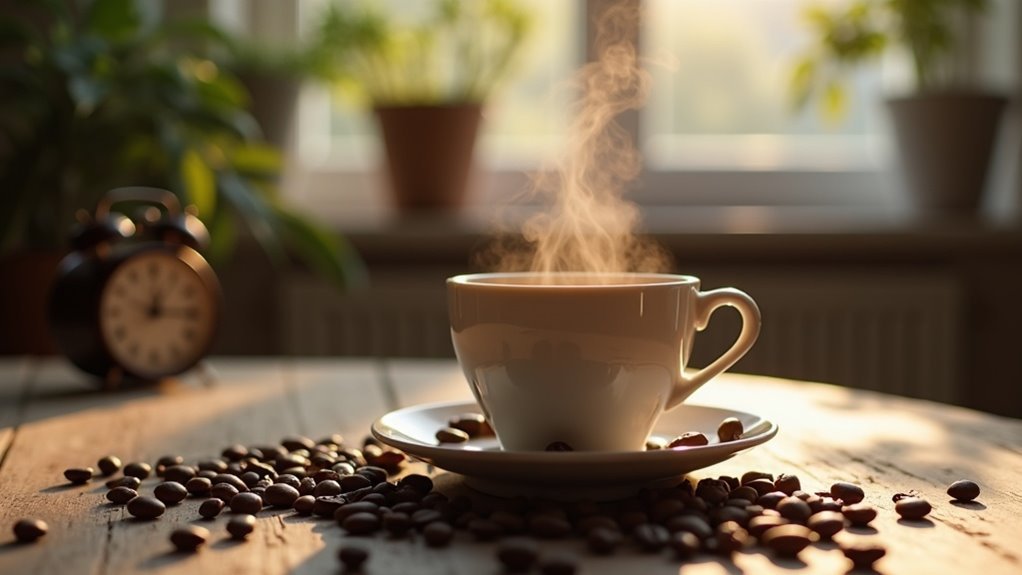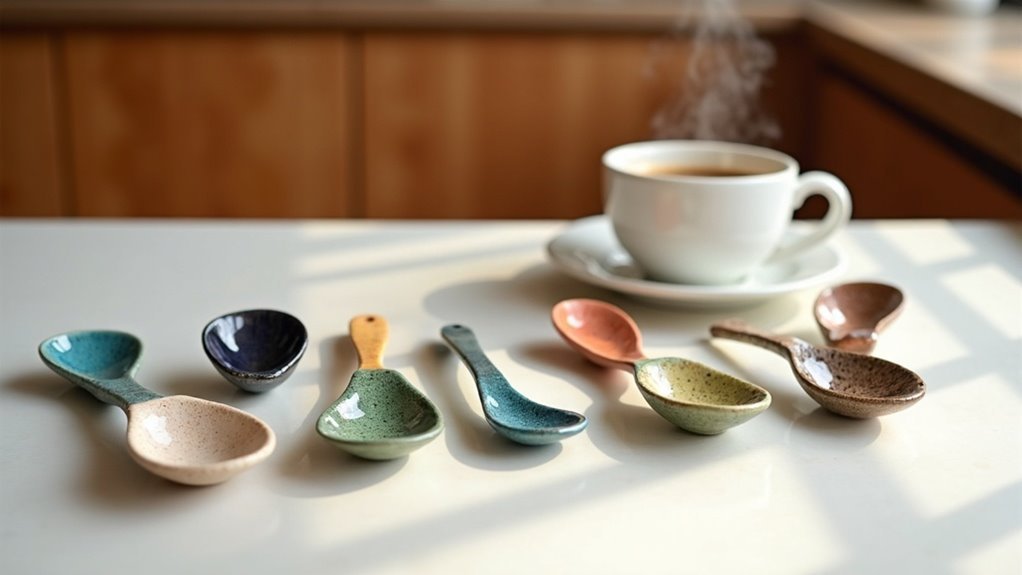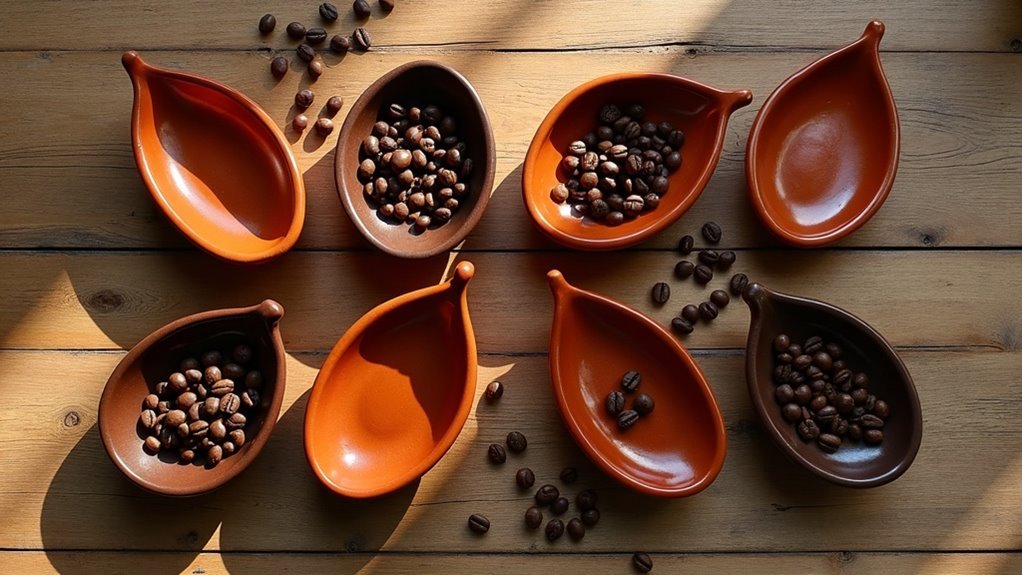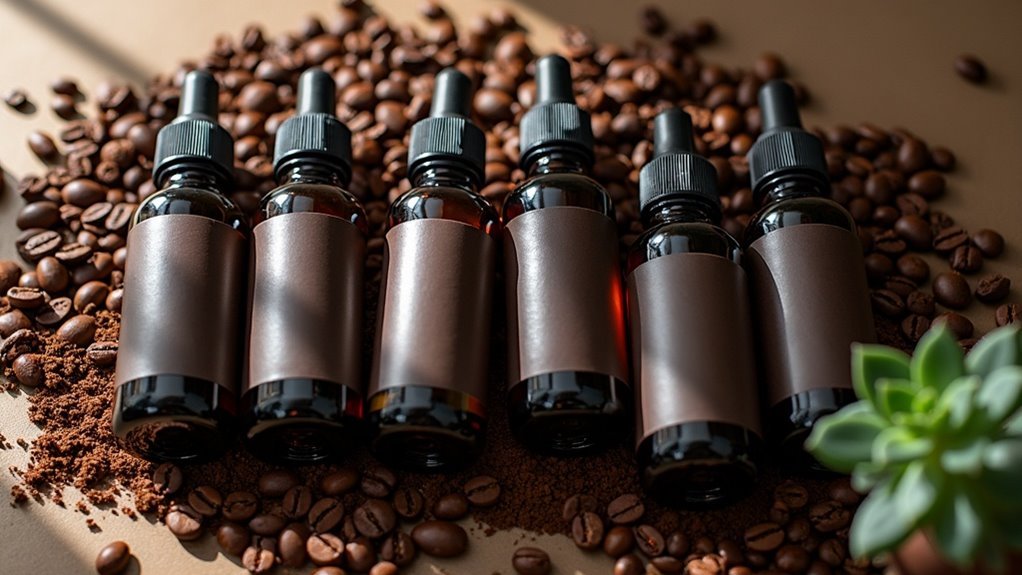Yes, coffee can worsen overactive bladder (OAB) symptoms due to its caffeine content, which acts as a diuretic. This leads to increased urgency and frequency of urination, especially when consuming over 200mg of caffeine daily. Symptoms often escalate with higher intake, and some individuals may be more sensitive than others. If you enjoy coffee but are concerned about OAB, you might consider alternatives like decaffeinated coffee or exploring ways to enjoy your favorite beverage while managing your symptoms. Remember to keep track of your intake and how it affects your bladder health.
Key Takeaways
- Coffee, due to its caffeine content, can increase bladder activity and worsen overactive bladder (OAB) symptoms.
- Exceeding 200mg of caffeine daily correlates with more severe OAB symptoms.
- Caffeine acts as a diuretic, leading to increased urgency and frequency of urination.
- For those managing OAB, decaffeinated coffee and herbal teas are safer alternatives.
- Keeping a coffee diary can help identify caffeine’s impact on individual bladder health.
The Impact of Caffeine on Bladder Function
When you consume coffee, it can greatly impact your bladder function. Coffee contains caffeine, which acts as both a stimulant and diuretic, increasing bladder activity and potentially leading to symptoms of overactive bladder (OAB) such as urgency and frequent urination.
Research indicates that exceeding 200mg of caffeine daily—approximately two cups of coffee—can exacerbate these symptoms, particularly in individuals who may not have previously experienced them. The relationship between coffee consumption and bladder health is dose-dependent; higher intake tends to correlate with greater symptom severity.
However, decaffeinated coffee may serve as a safer alternative, as it contains minimal caffeine and is less likely to negatively affect OAB symptoms.
Understanding Overactive Bladder Symptoms
Overactive bladder (OAB) symptoms can significantly impact daily life, including both physical and emotional well-being. Understanding these symptoms is crucial for managing bladder issues effectively.
Here are four common symptoms of overactive bladder:
- Sudden, uncontrollable urge to urinate.
- Frequent urination, often exceeding eight times a day.
- Involuntary leakage of urine, known as urge incontinence.
- Increased urgency following caffeine intake.
Caffeine, commonly found in coffee, can irritate the bladder, leading to a heightened urge and exacerbating OAB symptoms in sensitive individuals.
Recognizing these signs enables you to take proactive measures in addressing your overactive bladder symptoms, potentially allowing for a more enjoyable coffee experience and an improved quality of life.
How Coffee Consumption Affects Urination
While many people appreciate coffee for its stimulating qualities, it’s essential to recognize how its consumption can significantly influence urination patterns, especially in those with overactive bladder (OAB). Caffeine, a key component in coffee, functions as a diuretic, which can heighten the urgency and frequency of urination. Research indicates a dose-dependent relationship; as caffeine intake increases, OAB symptoms can intensify, even among individuals who previously experienced no issues. Therefore, keeping track of your coffee consumption is crucial for maintaining bladder health, as responses to caffeine can differ greatly from person to person.
| Caffeine Intake | Urgency Symptom Severity | Frequency of Urination |
|---|---|---|
| 0-100 mg | Low | Low |
| 100-200 mg | Moderate | Moderate |
| 200+ mg | High | High |
Alternatives to Coffee for Bladder Health
For individuals who are passionate about coffee but also concerned about bladder health, it’s important to consider options that can help manage symptoms associated with an overactive bladder.
Here are some effective alternatives to traditional coffee:
- Decaffeinated coffee – This option allows you to enjoy the rich flavors of coffee without the high caffeine content that can exacerbate bladder symptoms.
- Herbal teas – While not coffee, herbal teas like chamomile or peppermint can offer a comforting experience and soothing hydration without the diuretic effects of caffeine.
- Fruit-infused water – For a refreshing alternative, try adding non-acidic fruits, such as apples or berries, to your water. This creates a flavorful drink that hydrates without the adverse effects of coffee.
- Coconut water or almond milk – These low-acid beverages can be a gentle way to stay hydrated while avoiding caffeine, making them suitable substitutes for coffee enthusiasts.
Recommendations for Managing OAB Symptoms
Managing the symptoms of an overactive bladder (OAB) requires a multifaceted approach, particularly when considering coffee consumption. For those who enjoy coffee, it’s advisable to reduce caffeine intake to below 100 milligrams daily to help alleviate OAB symptoms.
Opting for decaffeinated coffee is a great alternative, as it generally contains minimal caffeine and is less likely to negatively impact bladder health. Additionally, consider lifestyle adjustments, such as limiting extra cups before long meetings, to improve your overall quality of life.
Keeping a coffee diary to track your consumption and its effects on your symptoms can be beneficial. This practice can help you identify patterns and triggers related to your OAB, ultimately guiding a more effective management strategy while still enjoying your favorite beverage.
The Role of Hydration in Bladder Management
Proper hydration plays a critical role in managing overactive bladder (OAB) symptoms, and coffee is a popular beverage that many people enjoy.
However, it’s important to note that caffeine can have a diuretic effect, which may exacerbate symptoms for some individuals.
While aiming for about 60 ounces of fluids daily is generally recommended, you might consider how coffee fits into your overall fluid intake.
It can be beneficial to monitor your hydration and adjust your coffee consumption based on how it affects your urgency and frequency.
Balancing coffee with water and other hydrating beverages can help minimize irritation to the bladder lining while still allowing you to enjoy your favorite drink.
Importance of Proper Hydration
Hydration plays a critical role in maintaining overall health, including bladder function and comfort, especially for coffee drinkers.
While enjoying your favorite brew, it’s essential to be mindful of your fluid intake. Here are four key aspects to consider:
- Aim for about 60 ounces of fluids daily, including your coffee, to keep urine light yellow.
- Preventing constipation is important, as it can worsen urinary symptoms, so balance your coffee consumption with plenty of water.
- Avoid excessive fluid restrictions while enjoying coffee to prevent concentrated urine and urgency.
- Spread your fluid intake throughout the day, sipping water between cups of coffee to stay adequately hydrated.
Enjoy your coffee, but remember to hydrate wisely!
Timing of Fluid Intake
While it might seem straightforward, the timing of your coffee intake can considerably impact bladder health, especially for those with overactive bladder (OAB) symptoms.
Spreading your coffee consumption throughout the day by sipping on it instead of drinking large amounts at once can help manage bladder function better. Be mindful of consuming excessive coffee, particularly before long meetings, as this may trigger a sudden urge to urinate.
Additionally, consider the amount of caffeine in each cup of coffee, as high caffeine intake can exacerbate OAB symptoms. Keeping a bladder diary can help identify your ideal coffee drinking schedule.
Hydration’s Impact on Symptoms
Balancing fluid intake plays a significant role in managing overactive bladder (OAB) symptoms. Proper hydration is essential, as insufficient fluids can worsen urinary issues. Here are some tips to help:
- Aim for about 60 ounces of fluids daily, but be mindful of your coffee consumption.
- While water is important, enjoy your coffee in moderation; limit to one cup to avoid exacerbating symptoms.
- Spread fluid intake throughout the day instead of consuming large amounts at once, including your coffee.
- Monitor your hydration levels and adjust based on your symptoms, keeping in mind how coffee affects you.








